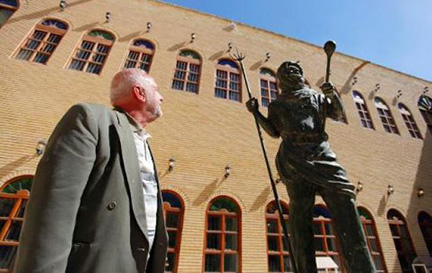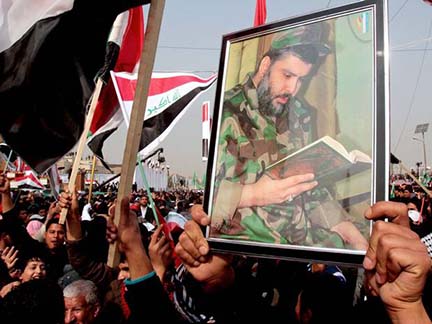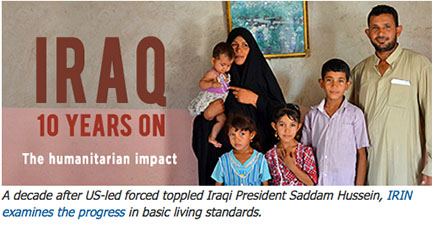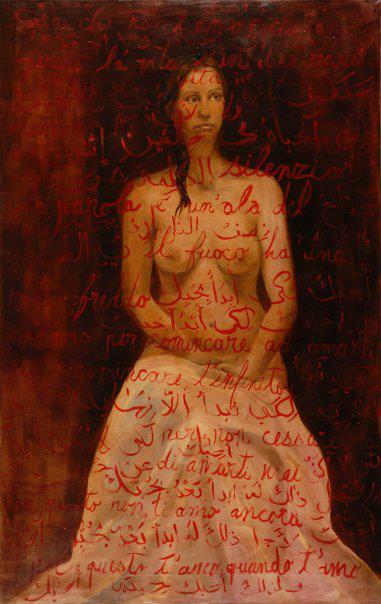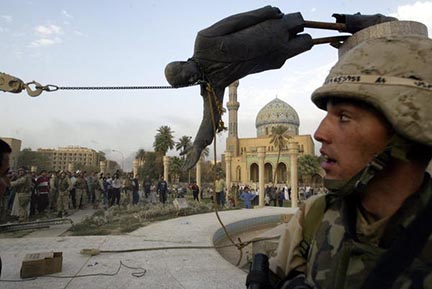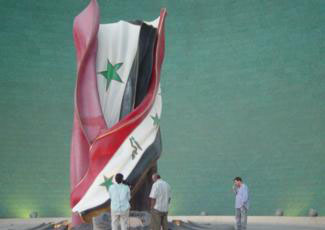
Sinan Antoon (far right) near the Symbolic Tomb at the Martyr’s Monument in Baghdad (2003). Image from Encounter Productions.
The Barbarian Has to Keep It Real: Interview with Jadaliyya Co-Editor Sinan Antoon
Interview with Nahrain Al-Musawi, al-Jadaliya, May 03 2012
[The following interview with Jadaliyya Co-Editor Sinan Antoon was conducted by Nahrain Al-Musawi and originally published in Al-Akhbar English on 2 May 2012.]
Sinan Antoon is an Iraqi-born novelist, poet, translator, filmmaker, and professor. His 2003 widely translated novel I’jaam is a fictional prison memoir. The book is ironic and haunting as it reflects the absurdities of Saddam Hussein’s Baathist regime, futile attempts to escape censorship, and prisoners going mad as a final act of revolt.
Antoon returned to Baghdad in 2003 and filmed About Baghdad, documenting the exhilaration and despair of Iraqis experiencing the fall of the Baathist regime and then the US occupation. He produced two collections of Arabic poetry, which have also been translated into English.
His most recent project is a translation of Mahmoud Darwish’s In the Presence of Absence (2011). Antoon has been at home in the US for decades, so when once asked about the distinction of being an Arab-American writer, he replied, “It’s not easy being a barbarian in Rome. The Romans rarely listen, but the barbarian has to keep it real.â€
In this interview, Antoon discusses the distinction of being a barbarian, “an outsider, a stranger,†in the US, as well as the trope of closure that frames the recent US withdrawal from Iraq, sectarianism discourse, and the unique quality of spatial fragmentation and division that now characterizes Baghdad – once Antoon’s home.
Nahrain al-Mousawi (NM): When and how did you leave Iraq? Can you talk about that experience a little bit?
Sinan Antoon (SA): I was supposed to leave Iraq in August 1990 to continue my studies abroad, but Saddam invaded Kuwait on August 2 and there was a travel ban. I survived the war and left in April 1991 after the war was over and the travel ban was lifted. I had always wanted to leave. Living under an authoritarian regime isn’t fun, especially for an aspiring writer who wasn’t willing to write in praise of the leader and his wars. (Some of those who made their names praising Saddam and his wars are running around now posing as patriotic anti-imperialists).
So I took the bus from Baghdad to Amman like thousands of Iraqis did and would do throughout the 1990s and later. I was happy to escape, but I shed a few tears as the bus drove away. I knew that I was leaving some irretrievable parts of my self and my life behind. I stayed in Amman for a few months and then was able to come to the US to do my graduate studies. I worked and did an MA in Arab Studies at Georgetown, then went on to get a doctorate in Arabic literature at Harvard. Continue reading The Barbarian Has to Keep It Real →

